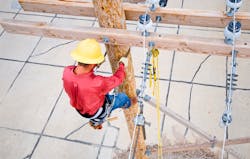Linemen put their lives on the line each day to power the nation. They scale gargantuan towers, dangle from helicopters and work on energized lines to restore power quickly to customers following severe storms.
While the job of a lineman is often hazardous, it is also exhilarating. Many linemen cannot see themselves having any other career. For them, being a lineman is not simply a job but a way of life.
As with any career, however, linemen face significant challenges. In this issue, T&D World zones in on a few of the top issues facing linemen, notably tapping into the latest tools and technology, training the next generation and restoring power following catastrophic storms. Here is what utility professionals are saying about these top three challenges and other issues facing line crews today:
-
Replacing retired linemen. Today's utility industry will soon face a skilled labor shortage as journeymen reach retirement. Oncor is encouraging its veteran linemen to provide on-the-job training to apprentices and pass their knowledge on to them, said Keith Hull, vice president of distribution operations. At AltaLink, the knowledge transfer is happening at breakneck speed, said Darryl Rempel of commissioning and acceptance.
-
Getting up to speed on new technology. Over the years, technology has transformed the field of line work, making linemen more productive and safer in the field. However, with these rapid technological innovations has come a wealth of challenges for field crews.
“Linemen must learn how to use new tools and equipment to stay competitive in the work force and increase reliability,” said Mark Marsh, crew supervisor of transmission for Santee Cooper in Moncks Corner, South Carolina.
-
Braving severe storms. For linemen, work is often not a nine-to-five job. Utilities call them in the middle of the night to restore power following severe weather events, which can take a toll on linemen and their families.
“As a dad, I've found it to be very tough,” said Wendell Boring, assistant vice president of electric delivery for EPB in Chattanooga, Tennessee. “Linemen often have to be gone for days on end because of storms or system emergencies.”
-
Staying safe. Linemen are under the gun to work incident free. To protect its line crews, Santee Cooper provides safety training, sets departmental goals and offers incentives, said George Patrick, supervisor of transmission lines.
-
Dealing with monotony. Crews often inspect overhead and underground facilities on a regular cycle, which can become routine and boring work, said Clayton Tong of San Diego Gas & Electric Construction Services. At times, utilities will give linemen more challenging and complex assignments, but this is not always possible due to unexpected after-hours circuit interruptions. As a result, field crews often have to stay current with scheduled work, which can lead to monotony.
-
Adapting to new work practices. Santee Cooper linemen must learn and accept changes to procedures such as grounding, switching and personal protective equipment. To keep its crews up to date, the utility provides internal training as well as safety audits. In addition, Santee Cooper is training linemen on live-line work procedures because they are increasingly being asked to work on energized lines rather than taking lines out of service.
-
Improving reliability. Linemen must report promptly during emergency outages and provide high-quality inspections of lines and equipment, Santee Cooper's Marsh said. The utility is striving to increase reliability by training its linemen to identify transmission and distribution structures that need to be maintained and educating them about their work's impact on the system's reliability.
-
Protecting the environment. Utilities are increasingly being asked to build new lines to carry clean, green electricity from wind farms and photovoltaic installations. To successfully work on these projects, today's linemen must learn how to interconnect the systems and become knowledgeable about renewable energy technology.
-
Upgrading aging infrastructure. Nationwide, utility infrastructure is starting to show signs of age. As a result, linemen are tasked with swapping out wood poles for steel poles or hardening a utility's system with fiberglass crossarms or stopgap structures. At Black Hills Energy, linemen are discovering broken porcelain cutouts and replacing them with ones made from epoxy, said Vincent Flores, line crew foreman.
-
Doing more with less. As utilities are increasing the workload for their field crews, they also are reducing the size of their crews. As a result, linemen are challenged with staying safe on the job while taking on increased responsibilities, said Steve Pirtle, supervisor 2 for Xcel Energy.
While the job of a lineman has its share of challenges, it also is a career that offers camaraderie and adventure. Linemen have the opportunity to work with their hands, be outside and power the nation for the energy needs of the future.
About the Author
Amy Fischbach
Electric Utilities Operations
Amy Fischbach is the Field Editor for T&D World magazine and manages the Electric Utility Operations section. She is the host of the Line Life Podcast, which celebrates the grit, courage and inspirational teamwork of the line trade. She also works on the annual Lineworker Supplement and the Vegetation Management Supplement as well as the Lineman Life and Lineman's Rodeo News enewsletters. Amy also covers events such as the Trees & Utilities conference and the International Lineman's Rodeo. She is the past president of the ASBPE Educational Foundation and ASBPE and earned her bachelor's and master's degrees in journalism from Kansas State University. She can be reached at [email protected].
